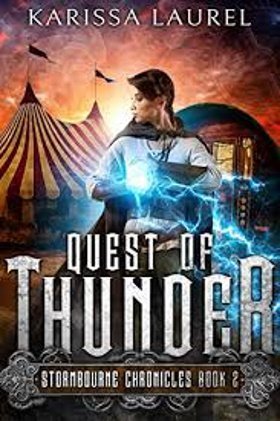“Good night, Genevieve.”
Chapter 15
After gathering our supper trays from Gepennio’s wagon, Genevieve and I headed for the wagon circle’s interior. “We’ve got to hurry,” I said, searching the crowd for one particular individual. “Falak or one of his minions will come for us soon.”
“Who are you looking for?”
Having spotted the subject of my query, I inclined my head in her direction. “Her.”
Genevieve squeaked. “The snake charmer? Why?”
“Because I have questions about the animals, and she’s the only member of this circus who uses one of Svieta’s creatures in her act.”
“Why don’t you go straight to the source and ask Svieta?”
“First of all, neither of us speak Svieta’s language. You know a lot, princess, but even you don’t understand a word she says. Talking to her would require involving another person, and I’m not willing to do that, yet. Secondly, Falak behaves as though the foundation of the animals’ abilities is a secret. If that’s true, then it’s Svieta’s secret, too, and she’s probably even less inclined to tell us than Falak would be.”
“Why such a burning need to know?”
I stopped abruptly and shot her a withering glare. “You get to prance around on the back of a docile unicorn. Meanwhile, Falak’s asking me to throw myself in with a man-eater who has already attacked and wounded someone. You think I don’t deserve to have a better understanding of these things before he tosses me into Sher-sah’s den?”
She twisted her lips into a pouty frown. “Well, when you look at it that way....”
Bashaya, in dark robes and a loose scarf draped around her head, looked up as we approached. Seated upon a short, padded stool, she grinned as her snake, Ajej, coiled around her shoulders. The serpent raised its head, peering at us as its long, thin tongue poked out, tasting the air. Closer inspection revealed the fine amount of detail involved in the creature’s construction, down to the copper scales concealing the snake’s individual joints. Those scales made a soft chittering noise as the snake’s body adjusted itself around its master’s neck. Inwardly, I shuddered.
“Hello, Bashaya.” I dipped into a shallow curtsey. “I was wondering if we could join you?” Glancing at Genevieve, I jerked my chin toward the snake charmer in a silent request for translation.
The princess narrowed her eyes. “Roll first.”
I huffed, but readjusted my grip on my dinner tray, balancing it long enough to pluck my dinner roll and deposit it atop Genevieve’s plate of fried bean patties. Satisfied, she nodded and turned to Bashaya. “Pardon...parlez-vous Gallcois?”
The snake charmer bobbed her head. “Oui.”
Genevieve cut her gaze to mine and grumbled something indistinct. “Well, that part was easy.” She raised her voice and bobbed a perfunctory curtsey. “Pouvons-nous asseoir avec vous?”
Bashaya nodded and gestured to the bit of open ground at her feet. “S’il vous plait.”
Following the princess’s lead, I eased to the ground, carefully positioning my dinner in my lap. We had eaten this way for a week, and I’d grown accustomed to dining picnic style. “Tell her I have questions about her snake.”
Dutifully, Genevieve translated my request.
Again, the snake charmer smiled. She uttered a short reply, and the princess interpreted. “She says, ‘most people do’.”
“Does she know Falak has asked us to perform with the animals, as well?”
Genevieve and Bashaya conversed while I pecked at my dinner and waited for the princess to apprise me. Finally, their banter quieted and Genevieve turned to me. “She does know about the trick riding. How could she not? It’s not like anyone was hiding it. But she didn’t know about Falak’s plans for you to perform with Sher-sah.”
“What does she think about it?”
She picked up one of her bean cakes, broke it in half, and nibbled a crispy bit along the edge. “She thinks it’s dangerous.”
I glanced at the snake charmer. “I’m glad we agree.”
“But that you should be alright if you earn the lion’s trust.”
I blinked at Bashaya, my eyes going wide. “Earn Sher-sah’s trust?” The snake charmer bobbed her head as if she understood. She stroked Ajej’s scales, and the snake’s tongue flicked out again. “How does one earn the trust of a mechanical beast?”
That question was the root of the issue that had been gnawing at me from the start. What was the truth of those creatures and how they seemed so vital and alive, and yet were clearly not?
Genevieve and Bashaya talked again, and I listened for any recognizable words despite the failings of my linguistic skills. When they fell silent again, the princess turned to me, and an uneasy look crossed her face. She glanced to the plate in her lap and tore her remaining bean cake into little pieces as she explained Bashaya’s words. “She’s reluctant to risk her place in the circus for a stranger, and giving away the circus’s secrets to outsiders is forbidden. However, she could be convinced to tell us a story we might find useful...for the right price.”
I flicked a quick glance at the snake charmer who had leaned in toward us. She knotted her fingers in her lap, and her snake had gone utterly still. White lines appeared at the edges of her mouth as she pressed her lips together.
“What does she want?” I asked. “I don’t have any money.”
“It’s not what you have so much as what you have access to.”
I furrowed my brow. “Spit it out, princess. What’s she talking about?”
“She says Camilla keeps a chest in the costume wagon. There’s a locked box inside containing a ring with emeralds in it. If we bring her the ring, she’ll tell us what she can.”
My mouth fell open. “She wants us to steal from Camilla?”
The princess shrugged. “Those are her terms.”
I set my dinner tray aside, leaned back, and examined the snake charmer. She returned my stare with her mouth set in a hard line. I didn’t have to ask the princess to translate for me. Bashaya’s expression clearly conveyed obstinacy. She wasn’t going to change her mind. I rubbed my hands over my face and groaned. “It wasn’t supposed to get so complicated.”
“What do you mean?”





















